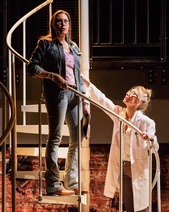SITE GUIDE
SEARCH
REVIEWS
REVIEW ARCHIVES
ADVERTISING AT CURTAINUP
FEATURES
NEWS
Etcetera and
Short Term Listings
LISTINGS
Broadway
Off-Broadway
NYC Restaurants
BOOKS and CDs
OTHER PLACES
Berkshires
London
California
New Jersey
DC
Connecticut
Philadelphia
Elsewhere
QUOTES
TKTS
PLAYWRIGHTS' ALBUMS
LETTERS TO EDITOR
FILM
LINKS
MISCELLANEOUS
Free Updates
Masthead
A CurtainUp Review
Informed Consent
|
Now that we can trace our genome, we're finally able to read the greatest story every told — the history of our species, written in our cells. And what is it telling us? That we're all cousins! There is a single mutation in the genes of every one of us that we can trace back to one woman in Africa, only a hundred fifty thousand years ago. — Jillian
|
 (from left) DeLanna Studi and Tina Benko (Photo: James Leynse.)
|
Although the tribe is reluctant to be used for this or any research, its governing body gives approval after listening to reasons to support it by Arella (Delanna Studi), a highly educated spokesperson for the tribe who discovers too late that she has not been told the entire truth. Studi, who has re-traced her own family's footsteps along the Trail of Tears for a live theatrical experience, is an empowering presence in the play, especially when she discovers that the testing has been used to include research into other diseases and with particular regard to the tribe's origins through DNA testing.
The soul-searching pro and con arguments regarding science, religious beliefs and tribal myths as constituting ultimate truth take up a significant portion of the play— especially Jillian's dilemma as she also battles with early on-set Alzheimer's, the disease that killed her mother. Her determination to conduct DNA tests is caused in part by her fear that her four year-old daughter Natalie (also played by Ms. Studi) may have inherited a propensity for the disease. She doesn't take into account that her testing has disproved the tribe's story of its origin. Benko, who recently played Marianne3 in Ivo Van Hove's Scenes from a Marriage, is excellent and believable, a tough cookie who is believable every step of the way from being fully in charge to ultimately being totally debilitated by what in the end remains, at least for her in the now, a genomic puzzler.
The reality of Jillian's condition and her disintegrating relationship with the scientific heads at the University and with the Native Americans who feel betrayed is not any better at home. There she is at odds with her Asian husband Graham (Pun Bandhu), a gentle children's book author who doesn't want to know her findings. The tense scenes between Jillian and Graham are fueled by their impassioned and opposing views on why their daughter's DNA should not be tested. One amusing scene finds Jillian requesting DNA samples from the mothers at Jillian's school.
The ninety-minute play, under Liesl Tommy's expert direction, is performed in a quasi-non-realistic manner with the multi-racial cast playing multiple characters, used to underscore the consideration of making us all as Jillian's suggests "cousins." They speak in clusters as a unified chorus. These moments are smoothly embedded into the more traditional narrative. The clever design structure by Wilson Chin provides a high archival-like wall that is flanked by four metal spiral ladders that imply the configuration of the genomic double helix.
Laufer, whose plays have been produced at Steppenwolf Theatre Company and many of the country's leading regional theaters, has created a disquieting but also invigorating play as well as a supposition: That the results of scientific research may be as stunningly indeterminate and inconclusive as is the belief and dependence we have on our eternal myths to validate who and what we are. This theme pervades throughout this thought-provoking play.
Scheduled: A series of Thursday night panel discussions featuring cast and creative team in conversation with members of the Native American and medical community. For links to various science and math related plays reviewed at Curtainup click here .
|
REVIEW FEEDBACK Highlight one of the responses below and click "copy" or"CTRL+C"
Paste the highlighted text into the subject line (CTRL+ V): Feel free to add detailed comments in the body of the email. . .also the names and emails of any friends to whom you'd like us to forward a copy of this review. For a feed to reviews and features as they are posted add http://curtainupnewlinks.blogspot.com to your reader Curtainup at Facebook . . . Curtainup at Twitter Subscribe to our FREE email updates: E-mail: esommer@curtainup.comesommer@curtainup.com put SUBSCRIBE CURTAINUP EMAIL UPDATE in the subject line and your full name and email address in the body of the message. If you can spare a minute, tell us how you came to CurtainUp and from what part of the country. |


 Fun Home -CD
Fun Home -CD The King and I -CD
The King and I -CD American in Paris -CD
American in Paris -CD